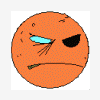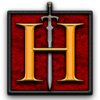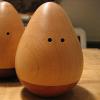I kind of have a thing against the basic Hit Point model in general. I think its overused.
What alternatives do we have?
I can only think of:
A) One-hit kill (2% of games)
B) Health (98% of games)
C) Independent limbs having health (Vagrant Story / Deus Ex)
You can mix it up a tiny bit by making enemies immune to certain types of damage, or damage from certain directions, but these are just mechanic "decorators" on top of the basic systems.
There's probably more mechanics to be invented. Do you have any ideas?
I figured I'd start a new thread. Now, this thread title is a bit of a misnomer, in that at it's core, some sort of damage tracking has to occur, and will almost always boil down to some sort of number tracking mechanism. But, that said, I really hate how hit points are used in almost all computer games, which is a standard integer number and said character merrily goes on about it's way as long as it has at least 1 hit point. It's a really basic and overused system, and it has all sorts of weird problems, and people try to tack on weird systems on top of it to fix those problems. (Like Aggro systems, which aren't needed as much in a system where running past and exposing your back to someone with a sword is a bad idea instead of a minor nuisance)
Anyway, these are game dependent of course, but semi generic.
Wounds:
Someone hits the player, they can receive a wound of varying severity, depending how successful the attack was. [Light, Moderate, Serious] For every light wound, the player gets a small penalty to their actions / defense /etc. But other than that, they can have an unlimited amount of small wounds. Moderate wounds cause greater penalties, and the player can only have X of them, Serious wounds are deadly serious, incurring major penalties, and the player can only have one, if another is incurred, they are knocked out / dead.
Now you'll notice, this is basically hit points, but it's bucketed. You can still whittle someone, but they won't die from taking 1 damage. They will die because all the whittling will have incurred a bunch of stacking penalties, allowing someone to get a serious blow through.
You can also do things like go into more detail (Light Head Wound), Have bucketed healing (resting after the end of battle auto heals all light wounds).
For Vehicular combat, I'd like to see more warthunder like combat systems. Damage components and internals, armor penetration over hit points.








